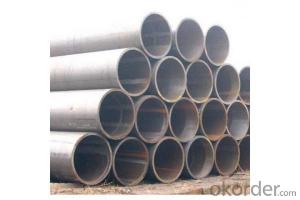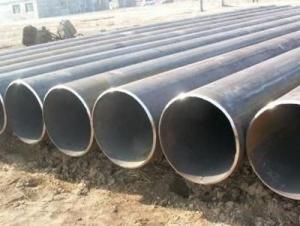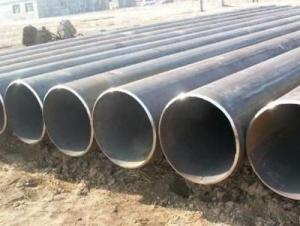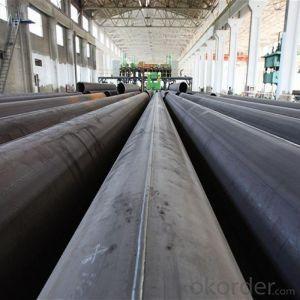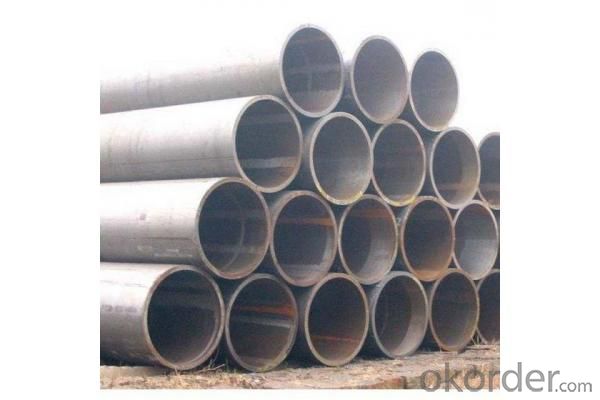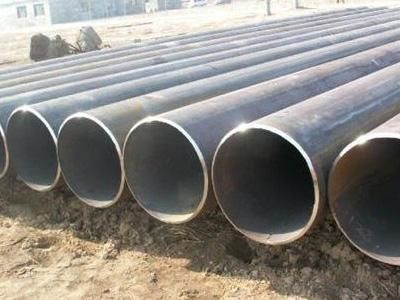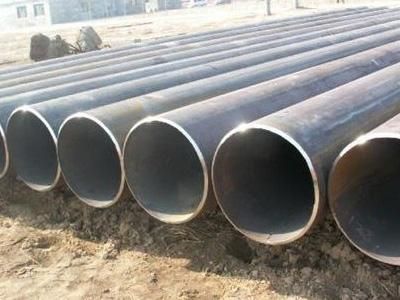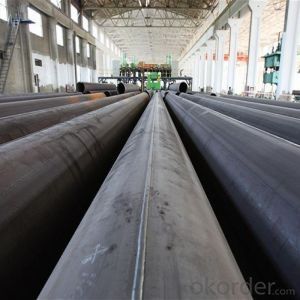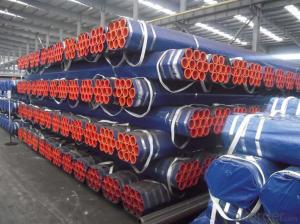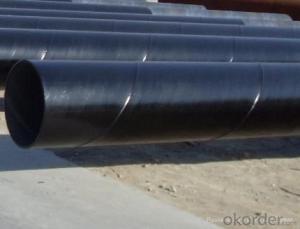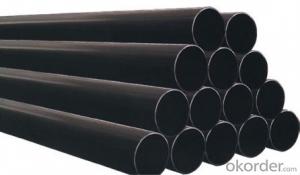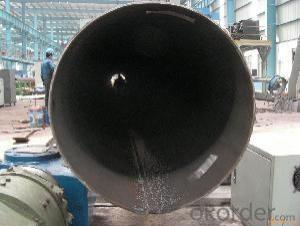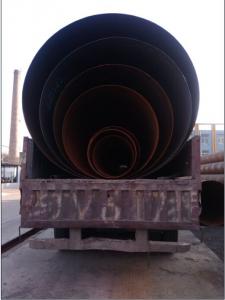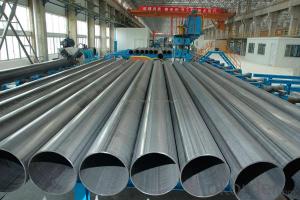CNBM LSAW STEEL PIPE 6''-48''
- Loading Port:
- China Main Port
- Payment Terms:
- TT OR LC
- Min Order Qty:
- -
- Supply Capability:
- -
OKorder Service Pledge
OKorder Financial Service
You Might Also Like
Packaging & Delivery
Packaging Detail: | Normal exporting packing,in container or bulk vessel or as per clients' request |
Delivery Detail: | 2 months after confimed contract |
Specifications
Large Diameter API 5L X70 PSL2 LSAW Steel Pipe
Grade: X42, X46, X50, X52, X60, B, C
OD: 1.5"-28"
WT: SCH10-SCH160
Brand:TPCO
Large Diameter API 5L X70 PSL2 LSAW Steel Pipe
Specifications:
u Standard: API 5L
u Grade: B, C, X42, X46, X50, X52, X56, X60, X65, X70, X80
u OD: 1.5"-28"
u WT: SCH10-SCH160
u Length: 5-12m
u Ends Finish: plain end, bevel end, grooved end
u Surface Treatment: bare, black varnished, oiled finish, red color, anti-corrosion, 3PE, FBE or epoxy coating
u Technique: hot rolled or cold drawn
u Application: api 5l steel pipe for conveying oil, water, gas
u Invoicing: based on theoretical weight or actual weight
u Payment Terms: L/C at sight, T/T or Western Union
u Trade Terms: FOB, CFR, CIF
u Certification: ABS manufacturing assessment, ABS design assessment, API 5CT, API 5L, DNV manufacturer certificate, ISO9001 quality management system certificate, ISO14001 environment management system certificate, GB/T28001 occupational health and safety management system certificate, A1 class manufacturing license of special equipment certificate, CCS, GL, LR, SGS, TüV, PDE
- Q: What is the difference between internal and external coating for steel pipes?
- Internal coating for steel pipes refers to the application of a protective layer on the inner surface of the pipe to prevent corrosion and increase durability. This coating is designed to withstand the flow of fluids or gases through the pipe, ensuring the integrity of the material and minimizing the risk of contamination. On the other hand, external coating for steel pipes involves applying a protective layer on the outer surface of the pipe to safeguard it from environmental factors such as moisture, chemicals, or mechanical damage. This coating acts as a barrier, shielding the pipe from corrosion and extending its lifespan. In summary, internal coating focuses on protecting the inner surface of the steel pipe, while external coating aims to safeguard the outer surface. Both coatings are crucial for ensuring the longevity and reliability of steel pipes in various applications.
- Q: How are steel pipes used in the agricultural sector?
- Steel pipes are commonly used in the agricultural sector for various purposes such as irrigation systems, drainage systems, and construction of structures like greenhouses and barns. They are durable, strong, and can withstand harsh weather conditions, making them ideal for these applications in the agricultural industry.
- Q: Can steel pipes be used for conveyor systems?
- Yes, steel pipes can be used for conveyor systems. Steel pipes are commonly used in conveyor systems due to their high strength, durability, and ability to withstand heavy loads and harsh environments. They provide a reliable and long-lasting solution for transporting various materials in conveyor applications.
- Q: Can steel pipes be used for conveying sewage and wastewater?
- Yes, steel pipes can be used for conveying sewage and wastewater. Steel pipes are commonly used in sewage and wastewater systems due to their durability and strength. They are resistant to corrosion and can withstand high pressure and flow rates. Additionally, steel pipes are able to handle the harsh chemicals and contaminants present in sewage and wastewater without deteriorating or affecting the quality of the conveyed fluids. However, it is important to ensure that the steel pipes are properly coated or lined to prevent any potential corrosion or contamination issues. Regular maintenance and inspections are also necessary to identify and address any potential issues that could arise in the system.
- Q: What are the different methods of pipe inspection for steel pipes?
- There are several methods of pipe inspection that can be used for steel pipes. Some of the commonly used methods are as follows: 1. Visual Inspection: This is the most basic form of pipe inspection where a trained inspector visually examines the exterior and interior of the pipe to identify any visible defects or abnormalities. This method is often used as a preliminary inspection before more advanced techniques are employed. 2. Magnetic Particle Inspection (MPI): MPI involves applying a magnetic field to the steel pipe and then applying iron particles to the surface. Any surface cracks or defects in the pipe will cause a leakage of magnetic flux, which can be detected by the inspector. This method is particularly effective in identifying surface defects in ferromagnetic materials. 3. Ultrasonic Testing (UT): UT is a non-destructive testing method that uses high-frequency sound waves to detect internal defects or anomalies in steel pipes. A transducer is used to send ultrasonic waves into the pipe, and the reflections or echoes of the sound waves are analyzed to determine the presence of defects such as corrosion, cracks, or wall thickness variations. 4. Radiographic Testing (RT): In this method, X-rays or gamma rays are used to create an image of the internal structure of the steel pipe. The X-rays or gamma rays pass through the pipe, and the resulting image can reveal any defects, such as cracks, corrosion, or weld discontinuities. This method is commonly used for inspecting welded joints. 5. Eddy Current Testing (ECT): ECT is a non-destructive testing technique that uses electromagnetic induction to detect surface and near-surface defects in steel pipes. A coil carrying an alternating current is passed over the pipe's surface, and any changes in the electrical conductivity or magnetic field caused by defects are detected and analyzed. 6. Acoustic Emission Testing (AET): AET is a method that detects and analyzes the high-frequency acoustic signals emitted by materials when they undergo deformation or damage. In the case of steel pipes, AET can be used to monitor and identify defects such as cracks, leaks, or corrosion by analyzing the acoustic signals emitted during service or under stress. These are just a few of the commonly used methods of pipe inspection for steel pipes. The choice of method depends on various factors such as the type of defect being looked for, the accessibility of the pipe, the desired level of sensitivity, and the cost and time constraints. It is often recommended to use a combination of inspection techniques to ensure a thorough assessment of the steel pipes.
- Q: What is the difference between ERW (Electric Resistance Welded) and LSAW (Longitudinal Submerged Arc Welded) steel pipes?
- ERW steel pipes are manufactured by high-frequency electrical currents passing through the metal, resulting in a welded joint. On the other hand, LSAW steel pipes are produced by submerging a metal plate into a welding zone, creating a welded joint through the use of a welding arc. The main difference lies in the welding process, with ERW pipes being more suitable for small to medium-sized diameters, while LSAW pipes are commonly used for larger diameter and thicker-walled applications.
- Q: What are steel pipes made of?
- Steel pipes are primarily made of steel, which is an alloy composed of iron and carbon.
- Q: How to distinguish seamless pipe and welded pipe?
- Most of the welded pipe is six meters, the pipe has obvious welding marks, and seamless pipe wall without welding marks
- Q: DN150 welded steel tubes one meter multiple
- DN150 welded steel pipe according to the thickness of two specifications: outer diameter 165mm, wall thickness 4.5mm, 17.81Kg per meter weight, wall thickness of 5.5mm, 21.63Kg. per meter weight
- Q: How do you calculate the pipe thermal expansion coefficient for steel pipes?
- The pipe thermal expansion coefficient for steel pipes can be calculated using the formula: α = (L2 - L1) / (L1 * (T2 - T1)) Where: α is the pipe thermal expansion coefficient L1 is the initial length of the pipe L2 is the final length of the pipe T1 is the initial temperature of the pipe T2 is the final temperature of the pipe. This formula takes into account the change in length and the change in temperature to determine the coefficient of thermal expansion for steel pipes.
Send your message to us
CNBM LSAW STEEL PIPE 6''-48''
- Loading Port:
- China Main Port
- Payment Terms:
- TT OR LC
- Min Order Qty:
- -
- Supply Capability:
- -
OKorder Service Pledge
OKorder Financial Service
Similar products
Hot products
Hot Searches
Related keywords
